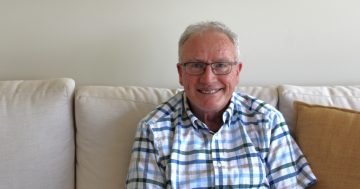
Wayne Jennings says being diagnosed with ADHD at age 40 explains a lot of his behaviours. Photo: Supplied.
Wayne Jennings remembers his young self as “the class clown” who often did odd things like disappearing from class to head into an empty playground.
“I’d have a million silly thoughts running through my head back then and many times I’d follow through,” he recalls.
Some were so whacky that he recalls spending a week sitting in the principal’s office as punishment.
“It was never sinister behaviour, but it was disruptive enough to get me expelled in Year 3,” says the father-of-five from Lake Heights, who is now 44.
“I always knew there was something different and quirky about me but I could never put my finger on it.”
It turns out that help rather than punishment was what he needed, because more than 30 years later, he received the diagnosis that he has the neurodevelopmental condition commonly known as attention deficit hyperactivity disorder (ADHD).
It is the topic of hundreds of studies on children, but less so on adults, although late diagnoses are becoming more common, particularly in women.
One in 20 people in Australia suffers from ADHD, with symptoms that include hyperactivity, inattention and impulsivity. Often those symptoms in children disappear or reduce as people reach adulthood.
“My life got a bit better in high school because there were more subjects to interest me,” Wayne says.
“If I liked a subject, I’d hyperfocus on it and excel, which I did by topping the class in French and Italian, while getting Ds in maths and English.
“It must have been frustrating for the teachers because just about every report sent home started off with ‘Wayne has potential, but he is easily distracted’.”
It was looking at those school report cards that initially persuaded Wayne to have a formal diagnosis by a psychiatrist at age 40.
“By that stage, it was a sense of relief more than shock, because everything in my life made more sense,” he says.
“I was also a little sad because with early treatment, things could have turned out better at school and also in earlier relationships which had been derailed by my impulsive behaviour.
“I often became fixated on things like fishing for a few weeks, and the next it was poker or a new puppy.”
But Wayne, who is the used vehicle sales manager at Toyota Albion Park, says ADHD isn’t all bad.
“One of the ADHD characteristics is unfiltered communication but customers often appreciate my directness,” he says.
“Some people say I can be a little blunt, but customers seem to appreciate that I don’t give them the hard sell, and it’s the perfect job because the fact I’m helping people gives me a dopamine rush.”
Wayne knows he will have the condition for life but he now manages it with medication and rigorous gym workouts.
“The first time I took the medication, I was amazed at how much it calmed my thought process,” he says. ”The gym workouts are also a good way to release the mental energy.”
For anyone who suspects they have the condition, he strongly recommends they seek a professional diagnosis, no matter what age.
“Looking back, I know it should have been obvious at school that my behaviour wasn’t normal, but I was one of many overexcited kids and it was overlooked by not only the school but also my parents,” he says with no sense of bitterness.
“Some adults with ADHD become train wrecks in adulthood, but I’ve got a family and great job so I’m pretty proud of those achievements.”











